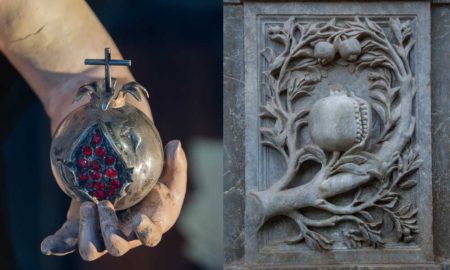- Aussie native vegetables on the menu. No Latin names, but Rhizowen Radix tell me: youlk = Platysace deflexa; kulyu = Ipomoea calobra.
- Another non-scientifically named plant is set to save the Amazon. Turns out it’s Ilex guayusa. Probably.
- World Bank to build genebank in Bolivia.
- World Coffee Research puts out nice variety catalogue.
- Our paper of a couple of years ago on globalized diets makes it to Scientific American and gets mashed up with the latest one.
- Purple patch for Purple Straw?
- Yes, you can garden clams.
Brainfood: Maize domestication, Eastern European grazing, Silk Road, Hybridization, European agroforestry, Japanese pears
- Recent demography drives changes in linked selection across the maize genome. Only a small part of teosinte contributed to maize.
- Changing year-round habitat use of extensively grazing cattle, sheep and pigs in East-Central Europe between 1940 and 2014: Consequences for conservation and policy. Animals don’t graze as much, or the same habitats, as they used to, which may not be altogether good for conservation of either plants or livestock because grazing was an important management intervention for thousands of years.
- Between China and South Asia: A Middle Asian corridor of crop dispersal and agricultural innovation in the Bronze Age. Wheat goes east, millets go west.
- Hybridization and extinction. Genetic swamping can happen, but hybridization can rescue a species too.
- Do European agroforestry systems enhance biodiversity and ecosystem services? A meta-analysis. Yes.
- Estimation of loss of genetic diversity in modern Japanese cultivars by comparison of diverse genetic resources in Asian pear (Pyrus spp.). The modern cultivars are variations on “Nijisseiki.”
Nibbles: Climate smart trifecta, Interdependence, Herbs trifecta, Rare breeds, Mexican maize, Ethiopian barley
- What the Pacific islands need to do about climate change. What, nothing about conserving and using crop diversity? My friends at CePaCT will be pissed.
- What West African farmers are doing about climate change.
- Yeah, I guess it’s not always and only about crop diversity. But would it kill them to mention it?
- And if you’re interested where the Pacific (and West Africa, and everywhere else) gets its food from…
- Peruvian black mint is a thing. But not a relative of coriander.
- Yaupon is also a thing. Though it won’t go far with that scientific name.
- Recreating a Renaissance herb garden. Because we can. Where’s the Peruvian black mint, though?
- Eat rare breeds to conserve them. Not rare advice.
- No wall can keep out landrace maize.
- Ethiopian beer gets a boost.
Brainfood: Agricultural heritage, Unique maize, B4N, Flax core evaluation, Oca conservation, Ag expansion, Rose wild relative, Quinoa evaluation, Nepal seed systems, Amazonian domestication, Analysing germplasm data
- Agricultural Heritage Systems: A Bridge between Urban and Rural Development. “…agricultural heritage systems can take full advantage of abundant funds…” Really?
- Multi cob-bearing popcorn (Puakzo) maize: a unique landrace of Mizoram, North East, India. Would be nice to know how unique globally.
- Enabled or disabled: Is the environment right for using biodiversity to improve nutrition? Maybe, in some places.
- Orbitide Composition of Flax Core Collection (FCC). In other news, Canada has a flax core collection.
- Farmer Perspectives on OCA (Oxalis tuberosa; Oxalidaceae) Diversity Conservation: Values and Threats. It’s the cultural value, stupid. And weevils.
- The expansion of modern agriculture and global biodiversity decline: an integrated assessment. Fancy maths shows that if you assume that unabated agricultural expansion is bad in a particular way, you can come up with a model which spares land at a modest cost to per capita consumption, given decent investment in research.
- Nuclear genetic variation of Rosa odorata var. gigantea (Rosaceae): population structure and conservation implications. Wild relative of domesticated rose shows lots of diversity and two distinct populations either side of a fault zone in China.
- Worldwide Evaluation of Quinoa: Preliminary Results from Post International Year of Quinoa FAO Projects in 9 Countries. 19 sites, 21 genotypes, a few winners. But the real story is how difficult it was to get hold of the material in the first place.
- Shaping Seed Regulation in Nepal: The Role of Networks, Community and Informality. The formal needs to recognize the informal. And vice versa.
- Crop domestication in the upper Madeira River basin. Nice, brief review of evidence of domestication for a number of crops along one branch of the Amazon.
- Analysing genebank collections using “R”: Making trait information widely available to users. NordGen takes genebank data analysis to the masses. And about time too.
Pomegranate symbolism through the ages
Those of you that remember us agonizing about the minutae of agrobiodiversity iconography, to the extent of wondering if this
was indeed what it seemed to be, will rejoice with us that, with regards to pomegranates at least, we seem to have found the motherlode.

LATER: And then some.
LATER STILL: And then some more.